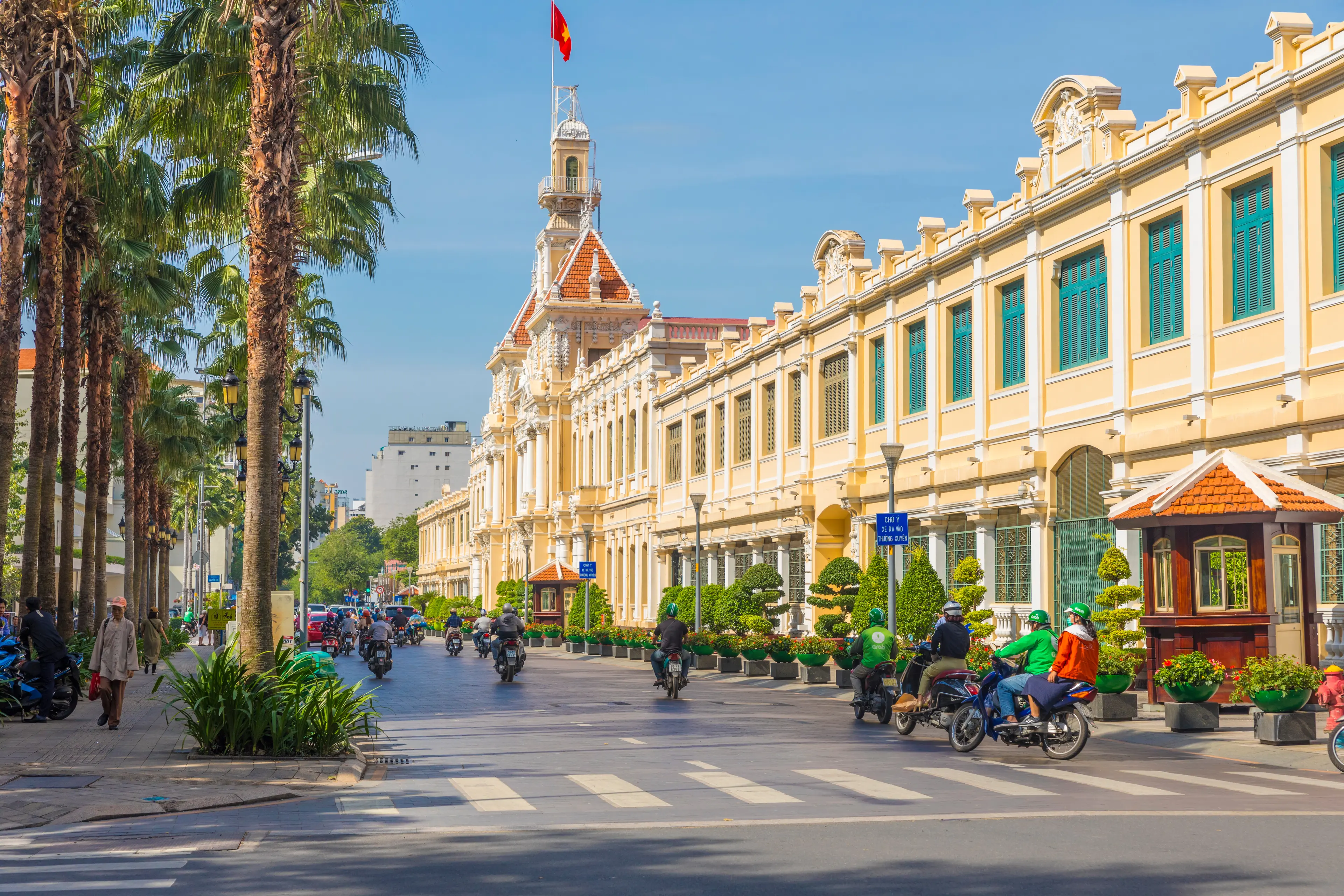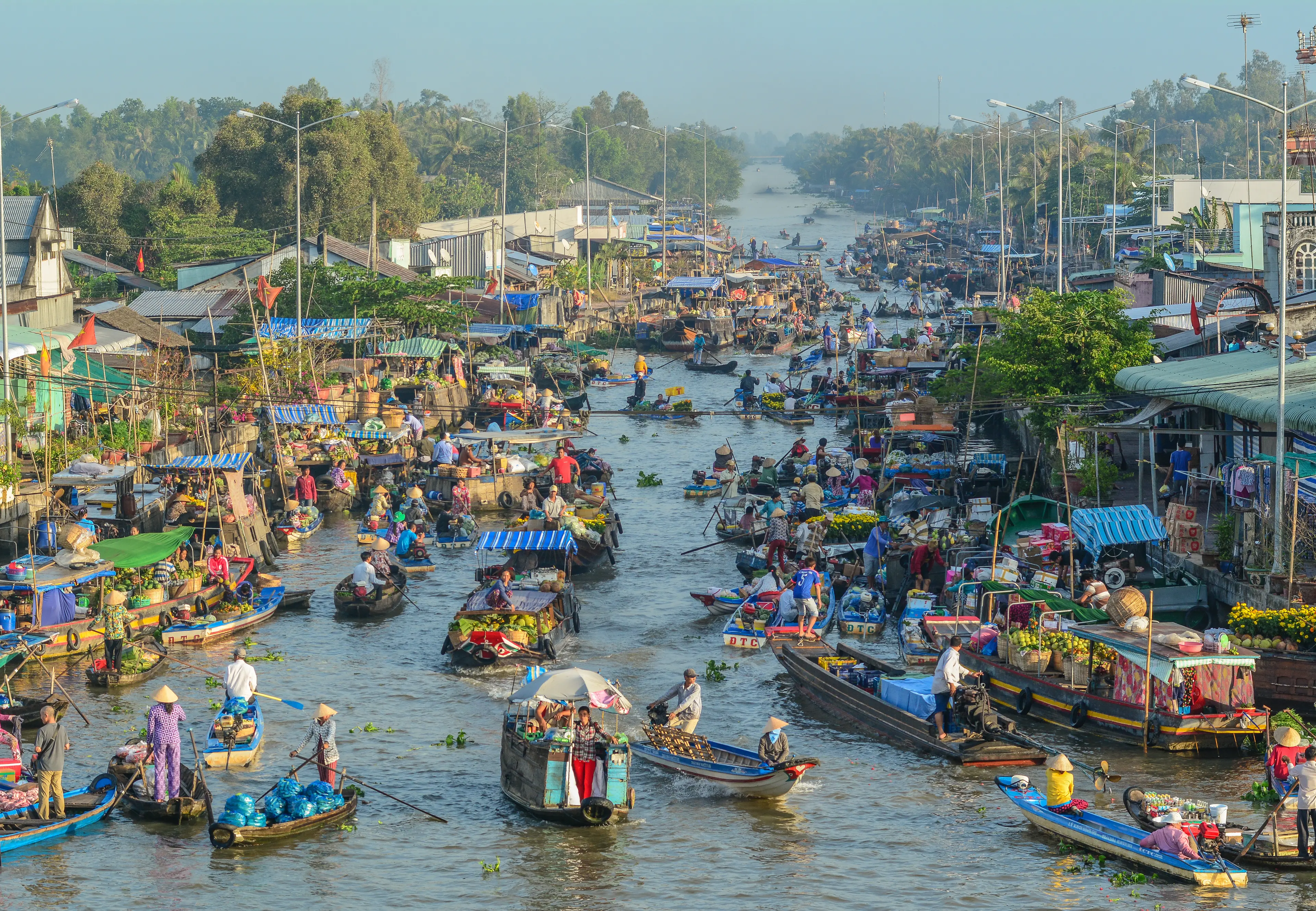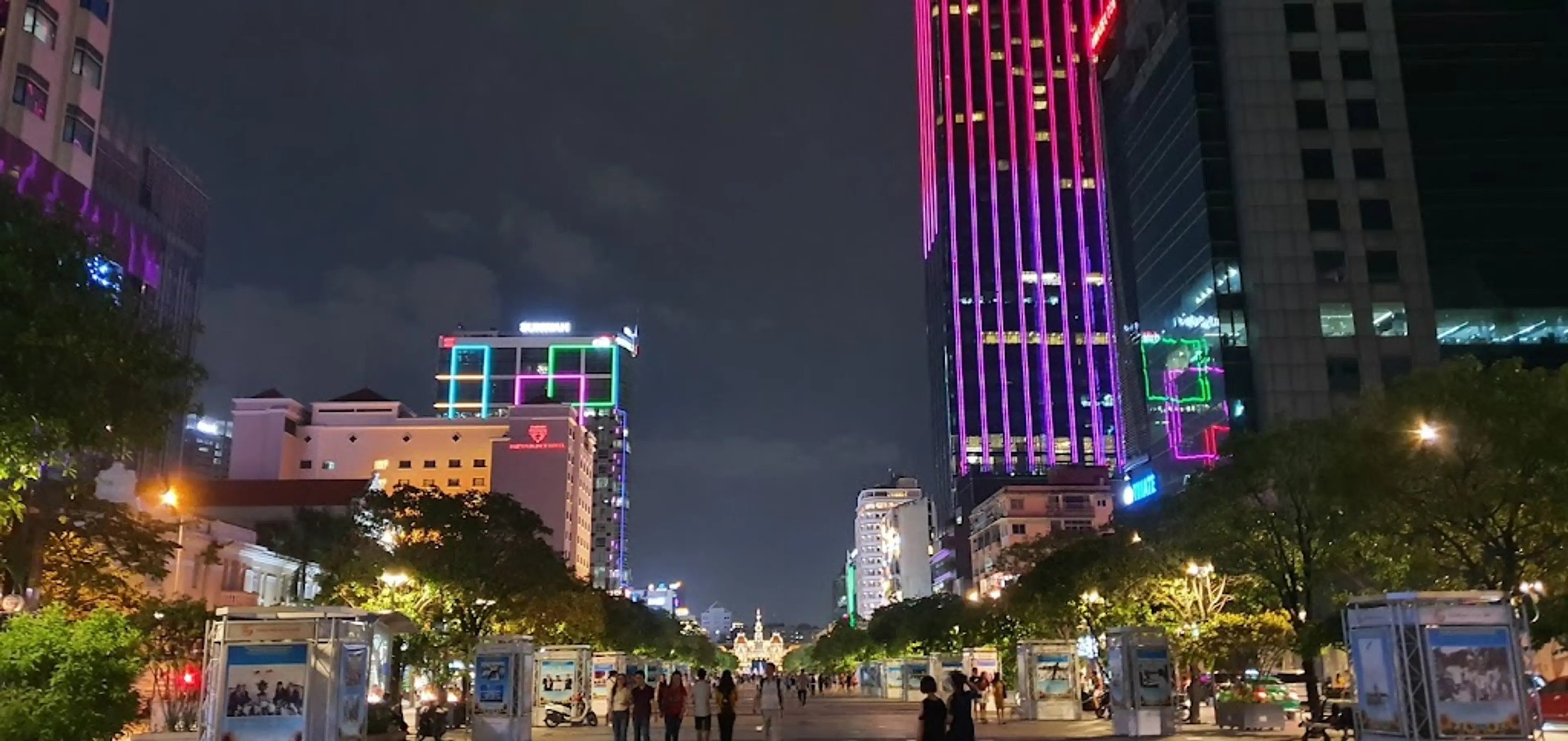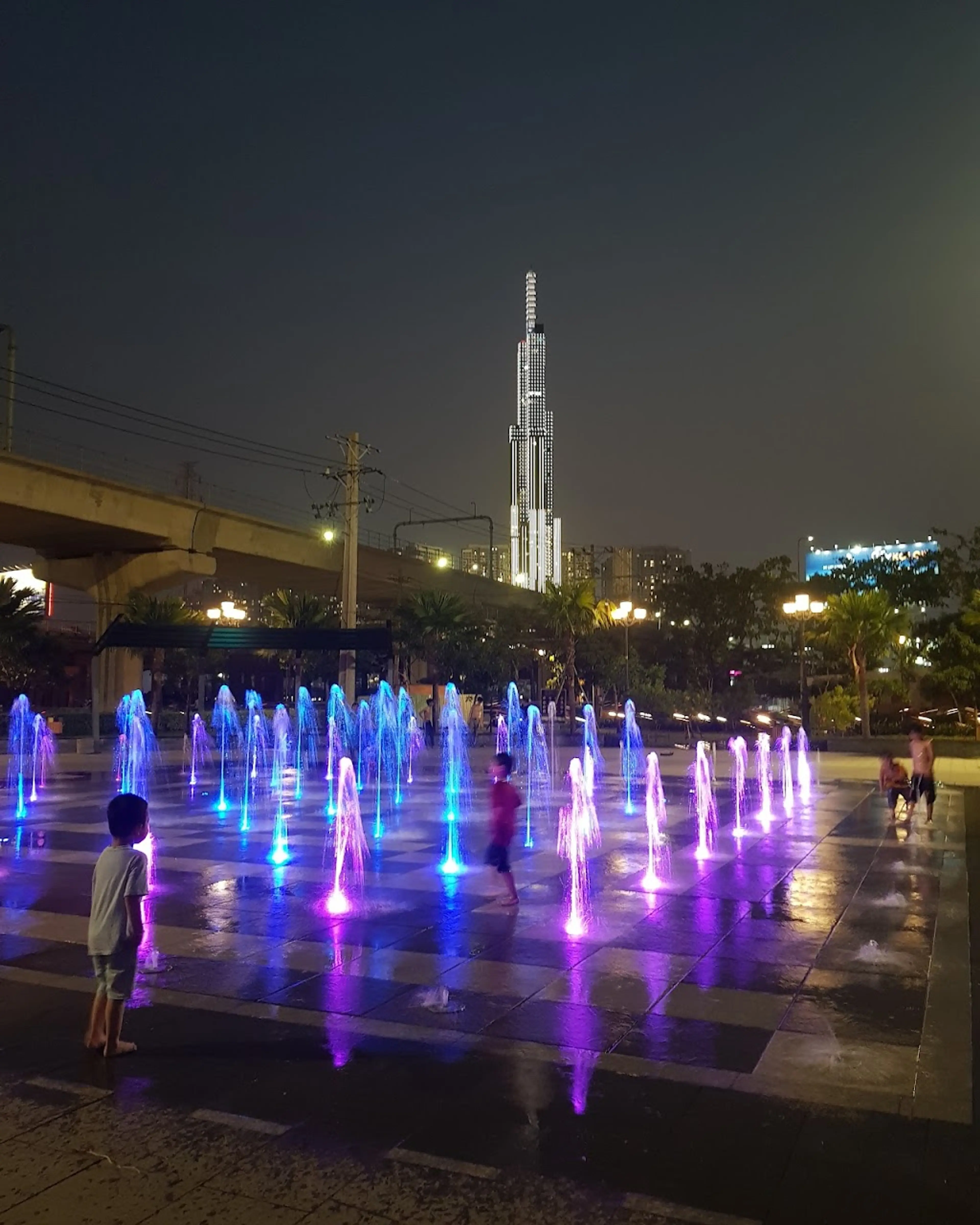6-Day Hidden Gems and Relaxation for Couples in Ho Chi Minh City
Ho Chi Minh City, Vietnam
6 days





About Ho Chi Minh City, Vietnam
Experience the vibrant energy of Ho Chi Minh City, Vietnam's largest metropolis. This city, formerly known as Saigon, is a bustling blend of the old and new, where skyscrapers tower over traditional markets. Explore the city's rich history at the War Remnants Museum and the Independence Palace. Wander through the narrow streets of Chinatown, and visit the ornate Thien Hau Temple. Enjoy the city's culinary scene, from street food stalls to high-end restaurants, offering a variety of Vietnamese delicacies. Don't miss the bustling Ben Thanh Market for shopping and a taste of local life. As the sun sets, enjoy the city's vibrant nightlife, with rooftop bars offering panoramic views. Ho Chi Minh City is a dynamic and fascinating destination that offers a unique blend of culture, history, and modernity.
6-Day Itinerary
Day 2
Day Trip to Cu Chi Tunnels and Cao Dai Temple
Morning
Visit the Cu Chi Tunnels, a network of underground tunnels used by the Viet Cong during the Vietnam War.
Lunch
Have lunch at a local restaurant in the Cu Chi District.
Afternoon
Explore the Cao Dai Temple, a unique religious site that combines elements of Buddhism, Christianity, Taoism, Confucianism, and Islam.
Dinner
Enjoy dinner at a local restaurant in Tay Ninh.
Evening
Return to Ho Chi Minh City and relax at your hotel.
Day 3
Exploring the Mekong Delta
Morning
Visit the Mekong Delta and enjoy a boat tour. The delta is known for its floating markets, fruit orchards, and rice paddies.
Lunch
Have lunch at a local restaurant in the Mekong Delta.
Afternoon
Continue exploring the Mekong Delta. Visit a local village and learn about their way of life.
Dinner
Return to Ho Chi Minh City and have dinner at a local restaurant.
Evening
Relax at your hotel or explore the nightlife in District 1.
Day 4
Visiting Landmarks in District 1
Morning
Visit the Reunification Palace, a landmark in Ho Chi Minh City. This was the site of the end of the Vietnam War when a North Vietnamese army tank crashed through its gates.
Lunch
Have lunch at a local restaurant in District 1.
Afternoon
Visit the Saigon Opera House, a beautiful example of French colonial architecture. You can also catch a performance here.
Dinner
Enjoy dinner at a local restaurant in District 1.
Evening
Take a leisurely stroll along Nguyen Hue Walking Street and enjoy the city's night lights.
Day 5
Exploring French Colonial Architecture in District 1
Morning
Visit the Saigon Notre-Dame Basilica, a cathedral established by French colonists. The cathedral was constructed between 1863 and 1880 and has two bell towers.
Lunch
Have lunch at a local restaurant in District 1.
Afternoon
Visit the Saigon Central Post Office, a beautifully preserved remnant of French colonial times and perhaps the grandest post office in all of Southeast Asia.
Dinner
Enjoy dinner at a local restaurant in District 1.
Evening
Relax at your hotel or explore the nightlife in District 1.
Day 6
Exploring Local Neighborhoods and Traditional Vietnamese Architecture
Morning
Spend your last day in Ho Chi Minh City exploring the local neighborhoods. Visit the Thao Dien neighborhood, known for its quiet streets and beautiful villas.
Lunch
Have lunch at a local restaurant in District 2.
Afternoon
Visit the Vinh Nghiem Pagoda, the largest Mahayana pagoda in Ho Chi Minh City. The pagoda is a beautiful example of traditional Vietnamese architecture.
Dinner
Enjoy your last dinner in Ho Chi Minh City at a local restaurant.
Evening
Take a leisurely stroll along the Saigon River and enjoy the city's night lights.
Attractions in Itinerary (13)

1Ben Thanh Market
A bustling market in the heart of the city, offering a wide range of goods from local produce to souvenirs.

2War Remnants Museum
A museum dedicated to exhibiting the atrocities of the Vietnam War, featuring military equipment, photographs, and personal stories.

3Saigon River
A major waterway in Vietnam, offering boat tours that provide a unique perspective of Ho Chi Minh City.

4Cu Chi Tunnels
A vast network of underground tunnels that were used by Viet Cong soldiers during the Vietnam War. These tunnels are a popular tourist attraction where visitors can experience what life was like for soldiers during the war.

5Cao Dai Temple
Cao Dai Temple is a place of worship for the Cao Dai religion, which is a blend of Buddhism, Christianity, Taoism, Confucianism, and Islam. The temple's architecture is a visual representation of this religious fusion, featuring dragons and divine beings from multiple faiths.

6Mekong Delta
A tour of the Mekong Delta offers a glimpse into the unique and vibrant life of the locals living along the river.

7Reunification Palace
A landmark in Vietnam, this palace is a symbol of the end of the Vietnam War in 1975. It features 1960s architecture and historical exhibits.

8Saigon Opera House
A French colonial building that hosts a variety of performances, including ballet, musical concerts, and traditional Vietnamese dance.

9Nguyen Hue Walking Street
A vibrant pedestrian street in the heart of the city, known for its shops, restaurants, and street performances.

10Saigon Notre-Dame Basilica
A beautiful cathedral built by the French colonists, featuring neo-Romanesque architecture and two bell towers.

11Saigon Central Post Office
The Saigon Central Post Office is a beautifully preserved remnant of French colonial times and perhaps the grandest post office in all of Southeast Asia.

12Thao Dien
An expatriate neighborhood known for its quiet, leafy streets, international schools, and high-end dining options.

13Vinh Nghiem Pagoda
Vinh Nghiem Pagoda, located in Ho Chi Minh City, is one of the most important Buddhist temples in Vietnam. It is renowned for its beautiful architecture that reflects traditional Vietnamese styles and its serene atmosphere that provides a peaceful retreat from the bustling city.
Local Food and Drinks (12)

Pho
A traditional Vietnamese soup consisting of broth, rice noodles, herbs, and meat, usually beef or chicken. Pho is a popular street food in Ho Chi Minh City and is considered a national dish of Vietnam.

Banh Mi
A Vietnamese sandwich made from a baguette filled with various ingredients such as pate, cold cuts, pickled vegetables, cilantro, and hot sauce. Banh Mi is a symbol of French colonial influence in Vietnam.

Bun Cha
A Vietnamese dish of grilled pork and noodle, which is thought to have originated from Hanoi, Vietnam. Bun Cha is served with grilled fatty pork over a plate of white rice noodle and herbs with a side dish of dipping sauce.

Com Tam
A Vietnamese dish made from broken rice, often served with a fried egg, grilled pork, and pickled vegetables. Com Tam is a popular breakfast and lunch dish in Ho Chi Minh City.

Banh Xeo
A crispy, stuffed rice pancake that is a popular street food in Vietnam. Banh Xeo is typically filled with pork, shrimp, and bean sprouts, and served with fresh herbs and a dipping sauce.

Goi Cuon
Also known as Vietnamese spring rolls, Goi Cuon are made with pork, shrimp, herbs, and rice vermicelli, all wrapped in rice paper. They are served at room temperature with a dipping sauce.

Ca Phe Sua Da
A traditional Vietnamese iced coffee made with dark roast coffee and sweetened condensed milk. Ca Phe Sua Da is a popular drink in Ho Chi Minh City, especially during the hot summer months.

Banh Trang Nuong
Often referred to as 'Vietnamese pizza', Banh Trang Nuong is a grilled rice paper with various types of toppings such as egg, dried shrimp, and green onions.

Chao Vit
A Vietnamese duck rice porridge that is a popular street food in Ho Chi Minh City. Chao Vit is typically served with ginger fish sauce and coleslaw.

Bia Hoi
A type of Vietnamese draft beer that is brewed daily and served in small bars and on street corners. Bia Hoi is a popular drink in Ho Chi Minh City due to its low alcohol content and refreshing taste.

Che
A traditional Vietnamese sweet beverage, dessert soup or pudding. Che can be made with a wide variety of ingredients, including mung beans, black-eyed peas, tapioca, jelly, fruit, and coconut cream.

Hu Tieu
A popular noodle soup in Southern Vietnam, Hu Tieu can be served with different kinds of broth or without broth (dry). The main ingredients are rice noodles, pork, and various herbs.
Best time to visit
The best time to visit Ho Chi Minh City, Vietnam is during the dry season, which runs from December to April. During this period, the city experiences less rain and the humidity is lower, making it the perfect time for sightseeing and outdoor activities. The average temperature during these months ranges from 21°C to 34°C. However, if you want to experience the city's vibrant festival culture, visiting during Tet, the Vietnamese New Year in late January or early February, would be ideal.
How to get around
Motorbike Taxi (Xe Om)
These are the most common form of transport in Ho Chi Minh City. They are quick, efficient, and can navigate through the city's heavy traffic. You can find them on almost every street corner. Make sure to negotiate the price before the ride.
Ride-Sharing (Grab)
Grab is a popular ride-sharing app in Vietnam. It offers both car and motorbike rides. It's convenient, safe, and you can pay either by cash or credit card. The app also provides an estimated fare before you confirm your ride.
Traditional Taxi
Traditional taxis are widely available in Ho Chi Minh City. Vinasun and Mai Linh are the most reputable taxi companies. They use meters, so make sure the driver turns it on at the start of your ride.
Cyclo
A cyclo is a three-wheel bicycle taxi that is a fun and leisurely way to see the city. It's best for short distances and not recommended for long journeys or during peak traffic hours.
Public Bus
Ho Chi Minh City has an extensive bus network that covers most tourist destinations. Buses are cheap and air-conditioned, but can be crowded during peak hours. English route information is available at major bus stations.
Private Car Hire
You can hire a private car with a driver for a day or for your entire stay. This is a comfortable and convenient option if you plan to visit multiple places in one day.
Walk
Walking is a great way to explore Ho Chi Minh City, especially the District 1 area where many tourist attractions are located. However, be aware of the traffic and cross the street with caution.
Bicycle Rental
Renting a bicycle can be a fun way to explore the city at your own pace. However, it's not recommended for those who are not used to cycling in heavy traffic.
Boat
Boat trips along the Saigon River are a unique way to see the city. There are several tour operators offering sunset cruises, dinner cruises, or trips to nearby attractions like the Cu Chi Tunnels.
Motorbike Rental
Renting a motorbike gives you the freedom to explore the city at your own pace. However, this is recommended only for experienced riders, as the city's traffic can be chaotic.
Important information
Currency₫ VND
Time zoneUTC+7
Driving sideRight
Emergency phoneAmbulance: 05; Fire: 08; Police: 03
Drinking waterOpt for bottled water
Power sockets
Voltage220 V
Things to know about Ho Chi Minh City, Vietnam as a first time visitor
1
Ho Chi Minh City is located in the tropical region, so it has a tropical climate. The average temperature is around 27-30 degrees Celsius (80-86 degrees Fahrenheit).
2
The city has two main seasons: the rainy season from May to November and the dry season from December to April.
3
Vietnamese is the official language, but English is widely spoken in tourist areas and hotels.
4
The local currency is the Vietnamese Dong (VND). Credit cards are accepted in most hotels, restaurants, and shops, but it's a good idea to carry some cash for smaller establishments or street vendors.
5
Tipping is not customary in Vietnam, but it is appreciated. In high-end restaurants and hotels, a service charge is often added to the bill.
6
Ho Chi Minh City is generally safe for tourists, but like any major city, petty crime like pickpocketing can occur. Be aware of your belongings, especially in crowded areas.
7
Traffic in Ho Chi Minh City can be chaotic, with a large number of motorbikes. Crossing the street can be a challenge. The key is to move at a steady pace and allow the traffic to flow around you.
8
Public transportation is available, including buses and a metro system. Taxis and ride-hailing services like Grab are also popular.
9
Vietnamese cuisine is diverse and delicious. Don't miss trying local dishes like pho, banh mi, and spring rolls.
10
Tap water is not safe to drink. Always opt for bottled water.
11
The city is bustling and can be noisy, especially during rush hour. If you're sensitive to noise, consider bringing earplugs.
12
Vietnam is a conservative country. Dress modestly, especially when visiting religious sites.
13
The standard voltage in Vietnam is 220V, and the standard frequency is 50Hz. Check if you need a power plug adapter or voltage converter.
14
Ho Chi Minh City is in the Indochina Time Zone (ICT), which is 7 hours ahead of Greenwich Mean Time (GMT+7).
15
The city has a vibrant nightlife, with a wide range of bars, clubs, and live music venues.
16
Bargaining is common in markets and some shops. Don't be afraid to negotiate the price.
17
Vietnam has strict laws on drug use. Possession, trafficking, and use of drugs can lead to heavy fines or imprisonment.
18
Vietnam has a rich history and culture. Learning a few basic phrases in Vietnamese and understanding local customs can enhance your experience.
19
Healthcare facilities in Ho Chi Minh City are improving, but it's recommended to have travel insurance that covers medical evacuation.
20
Always respect local customs and traditions. This includes not touching people's heads, not pointing with your feet, and removing your shoes before entering someone's home or a temple.
Basic Vietnamese to know as a first time visitor
English phrase | Native phrase | Pronunciation | When to use it |
|---|---|---|---|
Hello | Xin chào | Sin chow | Greeting someone |
Goodbye | Tạm biệt | Tam byet | Leaving or saying goodbye |
Thank you | Cảm ơn | Kam uhn | Expressing gratitude |
Yes | Có | Koh | Agreeing or confirming |
No | Không | Khawng | Disagreeing or denying |
Sorry | Xin lỗi | Sin loy | Apologizing |
Please | Làm ơn | Lam uhn | Making a request |
I don't understand | Tôi không hiểu | Toy khawng hee-oo | When you don't understand something |
Do you speak English? | Bạn có nói tiếng Anh không? | Banh koh noy teeng anh khawng? | Trying to find someone who speaks English |
Help | Cứu tôi | Koo toy | In emergencies |
Bathroom | Nhà vệ sinh | Nya vay sin | Looking for a bathroom |
Food | Thức ăn | Thook an | Looking for food |
Water | Nước | Nook | Asking for water |
Beer | Bia | Bee-ah | Ordering a beer |
Coffee | Cà phê | Ca fe | Ordering a coffee |
How much? | Bao nhiêu? | Bow nyew? | Asking for the price |
Too expensive | Quá đắt | Kwah dat | Negotiating a price |
Where is...? | Ở đâu...? | Uh doh...? | Asking for directions |
Hotel | Khách sạn | Khack san | Looking for a hotel |
I'm lost | Tôi bị lạc | Toy bee lack | When you're lost |
Packing List
Clothing
Lightweight clothing
Underwear
Socks
Swimwear
Comfortable walking shoes
Sandals
Rain jacket or umbrella
Sunglasses
Hat for sun protection
Toiletries
Travel-sized shampoo and conditioner
Body wash or soap
Toothbrush and toothpaste
Deodorant
Razor and shaving cream
Sunscreen
Insect repellent
First-aid kit with band-aids and antiseptic wipes
Prescription medications
Hand sanitizer
Travel documents and essentials
Passport
Visa (if required)
Driver's license or other ID
Airline tickets or e-ticket confirmation
Hotel and/or tour confirmations
Travel insurance documents
Copies of all these documents
Emergency contacts and addresses
Local currency (Vietnamese Dong)
Credit and debit cards
Electronics and gadgets
Smartphone
Charger for smartphone
International power adapter
Headphones
Camera
Charger for camera
Memory cards for camera
Portable power bank
Miscellaneous items
Travel pillow
Travel blanket
Earplugs and eye mask
Snacks
Water bottle
Books or e-books for leisure reading
Travel guidebook for Vietnam
Maps of Ho Chi Minh City
Travel-sized laundry detergent
Plastic bags for dirty clothes or shoes
Weather Conditions
Ho Chi Minh City, located in Vietnam, experiences a tropical climate which is characterized by high humidity and two distinct seasons - the wet season and the dry season. The dry season, from December to April, is generally considered the best time to visit. During this period, the city experiences average temperatures ranging from 21°C (70°F) to 34°C (93°F). The weather is mostly sunny with less rainfall, making it ideal for outdoor activities and sightseeing. However, it's advisable to carry a hat, sunglasses, and sunscreen to protect yourself from the intense sun. The wet season, from May to November, is characterized by heavy but short-lived downpours, usually in the afternoon. The average temperature during this season ranges from 24°C (75°F) to 35°C (95°F). Despite the rain, the city remains vibrant and bustling. If you're planning to visit during this period, it's recommended to carry an umbrella or raincoat and waterproof footwear. Regardless of the season, the city's high humidity can make the heat feel more intense, so it's important to stay hydrated. Also, air-conditioned places like shopping malls, museums, and restaurants can provide a respite from the heat. Remember, weather can be unpredictable, so it's always a good idea to check the forecast before your trip and pack accordingly. Enjoy your visit to Ho Chi Minh City!
| Month | Hi / Lo (°C) | Weather Overview |
|---|---|---|
January | 31° / 21° | January is the coolest month in Ho Chi Minh City, with temperatures ranging from 21°C to 31°C. It's a great time to visit if you prefer cooler weather. |
February | 32° / 22° | February sees a slight increase in temperature, ranging from 22°C to 32°C. The weather is still relatively cool, making it a good time for sightseeing. |
March | 34° / 24° | March marks the beginning of the hot season with temperatures ranging from 24°C to 34°C. It's a great time to visit if you enjoy the heat. |
April | 35° / 25° | April is one of the hottest months in Ho Chi Minh City, with temperatures ranging from 25°C to 35°C. Be sure to stay hydrated and wear sun protection. |
May | 34° / 24° | May sees a slight decrease in temperature, ranging from 24°C to 34°C. The weather is still hot, but there's also a higher chance of rain. |
June | 34° / 24° | June is the start of the rainy season, with temperatures ranging from 24°C to 34°C. It's a good time to visit if you don't mind the occasional shower. |
July | 34° / 24° | July is similar to June, with temperatures ranging from 24°C to 34°C. The weather can be unpredictable, with sunny days and sudden showers. |
August | 34° / 24° | August continues the rainy season, with temperatures ranging from 24°C to 34°C. Despite the rain, the city remains vibrant and lively. |
September | 34° / 24° | September sees a decrease in rainfall, with temperatures ranging from 24°C to 34°C. It's a good time to visit if you prefer less rain. |
October | 34° / 24° | October is the end of the rainy season, with temperatures ranging from 24°C to 34°C. The weather starts to cool down, making it a great time for outdoor activities. |
November | 33° / 23° | November sees a further decrease in temperature, ranging from 23°C to 33°C. The weather is cooler and drier, making it a great time to explore the city. |
December | 32° / 22° | December is one of the coolest months in Ho Chi Minh City, with temperatures ranging from 22°C to 32°C. It's a great time to visit if you prefer cooler weather. |
Did you know?
Places near by Ho Chi Minh City, Vietnam

Can Gio Mangrove Forest
A UNESCO Biosphere Reserve with rich wildlife and biodiversity.

Cu Chi Tunnels
A vast network of underground tunnels used during the Vietnam War.

Vung Tau
A popular seaside resort with beaches, a lighthouse, and a giant Jesus statue.

Mekong Delta
A vast maze of rivers, swamps, and islands, home to floating markets and villages.

Black Virgin Mountain
The highest mountain in southern Vietnam, known for its spiritual significance.

Cat Tien National Park
A large national park with diverse wildlife and ancient trees.

Dalat
A cool, misty city in the highlands known for its French colonial architecture.

Phan Thiet
A coastal city known for its red sand dunes, beaches, and seafood.

Hoi An
A well-preserved ancient town known for its mix of architectural styles and traditional culture.
